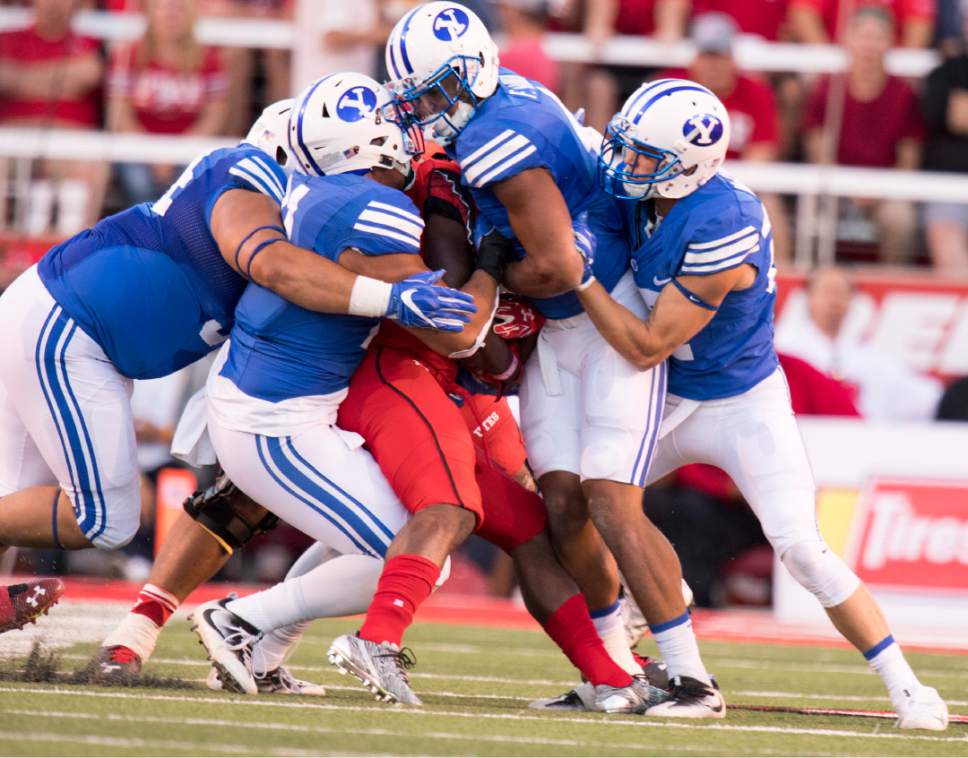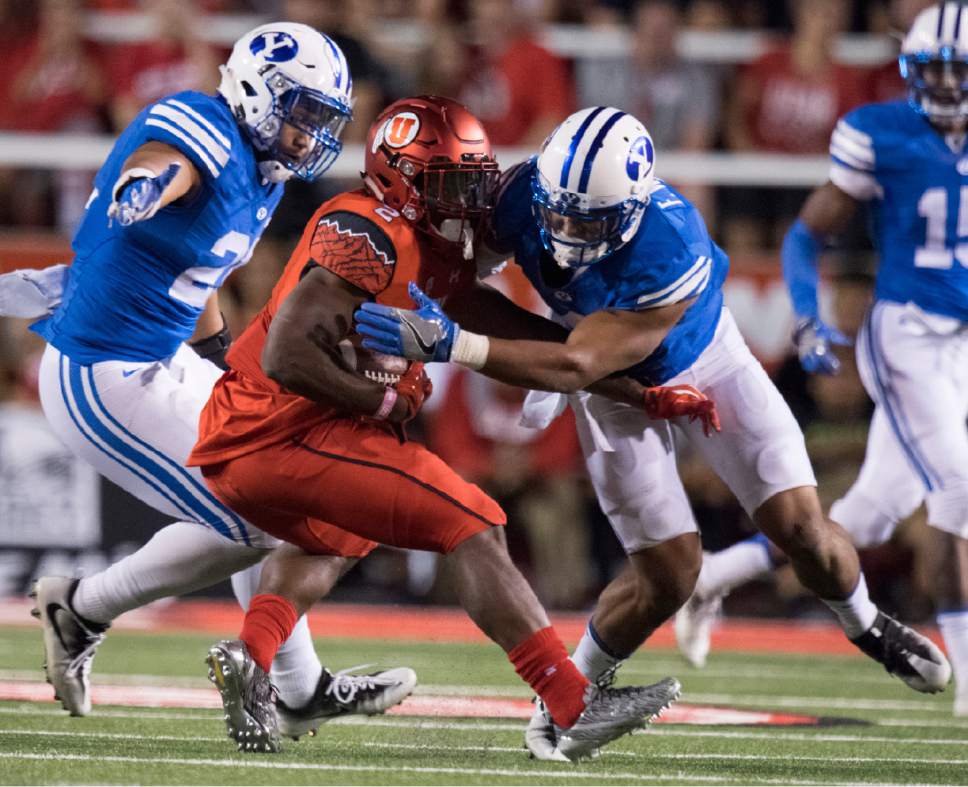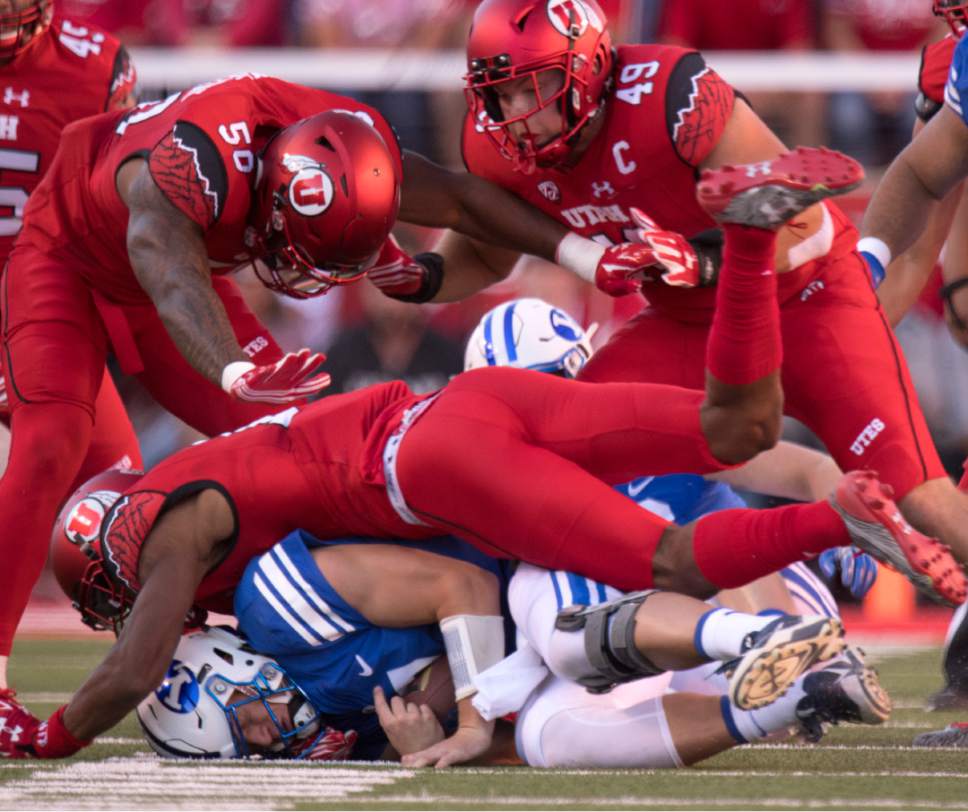This is an archived article that was published on sltrib.com in 2017, and information in the article may be outdated. It is provided only for personal research purposes and may not be reprinted.
Football is starting and life is about to get a whole lot better, right?
Balls spiraling through the air, the competition, the physicality, the running, the action, the teamwork, the grass and the mud and the sweat, the touchdowns, the excitement, the marching bands, the brats and burgers on the grill, the aromas wafting through the stadium in the cooling air.
Yeah, it's glorious.
Everything except for the guilty feelings.
The feelings, stirred within those of us who love and watch the game, that come by way of additional research and the knowledge that football is hurting people, killing people, the people who play it.
Bones sometimes heal. Brains do not.
We've seen the studies, like the one the other day revealing that 110 of the 111 brains donated for study of former NFL players were found to have evidence of CTE, damage caused by the repetitive hits associated with football. The research that shows it's not just the big traumatic hits that do the harm, it's the pop-pop-pop contact that comes on nearly every play. And, as is logical, the longer football is played, the higher levels at which it is played, the worse the damage can get.
So what are we supposed to do with that?
Should we conveniently believe guys who say the football-CTE thing is a myth? Or are they the ones we really should wonder about?
Go ahead, read the reports and research yourself. We can nitpick at the results, say that the studies are flawed, that they aren't comprehensive enough, that they don't really prove football is harmful, that it's circumstantial, that it doesn't affect everyone, that the brains studied are exceptional cases, that it doesn't actually mean what it seems to mean, that better helmets can fix the problem, that changes to the rules will help, that rugby-style tackling will do the trick.
I'm worried, man.
Perhaps more research will come to different or at least more promising conclusions. I hope, hope, hope that's it. But is it? What if it's not?
Now we're sounding like the NFL for all those dark, cloaked years and its bevy of so-called experts. Sure, the league finally has come partially around, offering up millions to fund more research. But it most certainly was slow in getting to what appears to be troubling and real.
America's favorite sport looks to be flawed, if not at the primary levels, certainly at the highest. What kind of additional irony is there in the idea that guys who go to college to fill their minds with enlightening thoughts are going to class in the morning then heading out to the university's practice fields to dim the very brains they're supposedly brightening?
It's a sad irony.
Professionals, though, can make millions of dollars. They know what they're getting themselves into and are willing to take the hits to pay the price. Maybe they know that, maybe they don't, not to the extent they should, and they eventually will.
I already have interviewed enough former players who are concerned with what they've done to themselves on the field. One puts the cereal box in the refrigerator and the carton of milk in the cabinet without realizing in the moment the mixup. Another gets headaches, still feeling the pain of contact initiated two decades ago. Another gets lost driving through his own neighborhood.
How do we react to that?
Ignore it? Forget about it? Stash it away in the far reaches of our own minds and our consciences and enjoy what we've always enjoyed about football? The strategy, the agility, the brutality? The violence?
And … crap, the cerebral damage.
Some of the former players say having played the game they love was worth it to them, even in their lingering pain, that their lives and their identities are so tied to the sport they were blessed — and worked so hard — to be good at that they have no regrets.
But those aren't the ones who have hit a wall of despair, who don't really know who they are anymore, who haven't thought about taking their own lives. Those who have are just the too-often forgotten few. They are the unfortunate minority of a greater, healthier whole, right?
Still, aren't we now conflicted? I cover the sport for newspaper and radio, telling the stories of those who play it and coach it, offering opinions on performances of individuals and teams, the outcomes of the games they play, the losses they suffer and the victories they gain.
How about this opinion. … The entire endeavor, or major parts of it, should be called into question.
No, no, no. Say it ain't so.
For the time being, I'll go on sticking my head in the sand, while others — extraordinarily large and fast and strong men, the gladiators of our day — get their heads repeatedly bumped and sometimes bruised. Balls spiraling through the air, the speed of the game, the physicality of it, the strategy, all of it being appreciated, the physicality, the pageantry of football.
And then, there's the hypocrisy of appreciating football's physical pageantry.
How long can we go on ignoring or downplaying or dancing around the evidence, the research, the truth?
It hurts my head thinking about it. How's yours feeling?
GORDON MONSON hosts "The Big Show" with Spence Checketts weekdays from 3-7 p.m. on 97.5 FM and 1280 AM The Zone. Twitter: @GordonMonson.







